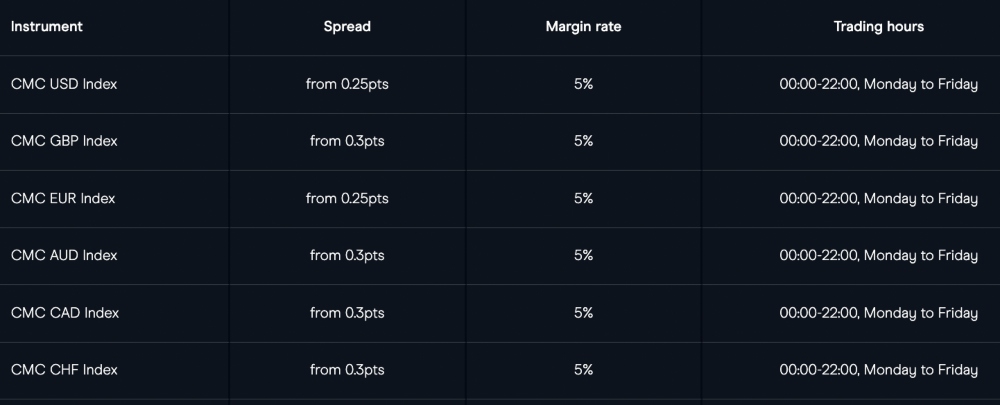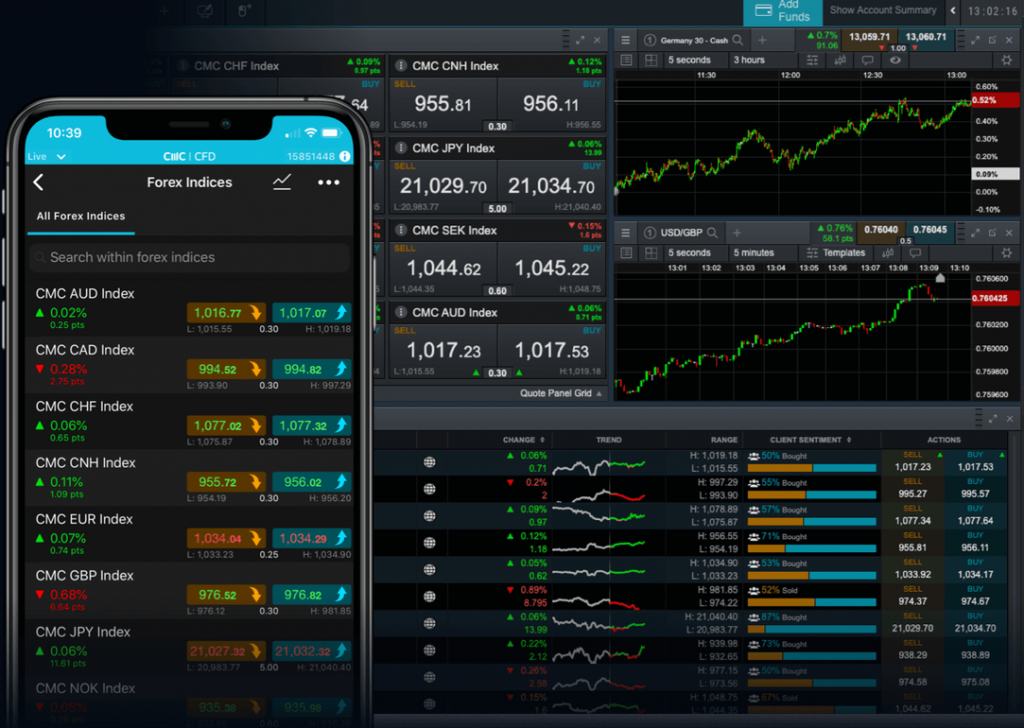Forex index trading allows investors to speculate holistically on the value of a currency rather than trading a single currency pair. This guide will compare trading currency pairs vs forex indices, popular strategies, and how to find the best brokers for currency index trading.
What Are Indices In Forex Trading?
In finance, an “index” is a collection of assets bundled together to represent a particular market sector. A forex index aims to track the value of a single currency in relation to a number of other significant currencies, all bundled up into one single figure.
The forex indices achieve this by tracking a basket of individual currency pairs, which are weighted to provide a theoretically balanced value for the main currency. This reduces exposure to a single currency pair and aims to provide a trading vehicle based on a single currency.
For example, the US Dollar Index is calculated by combining a basket of currencies from major global nations, including the UK, Canada and Switzerland. The weighting of the individual currency pairs is:
- 57.6% – Euro/US Dollar (EUR/USD)
- 13.6% – US Dollar/Japanese Yen (USD/JPY)
- 11.9% – British Pound/US Dollar (GBP/USD)
- 9.1% – US Dollar/Canadian Dollar (USD/CAD)
- 4.2% – US Dollar/Swedish Krona (USD/SEK)
- 3.6% – US Dollar/Swiss Franc (USD/CHF)
Major forex indices include the aforementioned US Dollar Index, the Euro Currency Index and the Swiss Franc Index.
However, there are also forex currency indices available for minor and exotic currencies, such as the Swedish Krona Index and Norwegian Krone Index.
Forex Index Trading vs Forex Pair Trading
The main difference between trading forex pairs and indices is diversification. When trading forex pairs, investors are speculating on the price relationship between two currencies. This relationship is often more volatile than a forex index and the major assets such as USD/EUR are more liquid. On the other hand, forex index trading provides a more balanced value of a single currency.
Another difference is available assets. While there are hundreds of currency pairs, there are far fewer forex indices. Trading forex pairs vs indices, therefore, is a good way to speculate on minor or exotic currencies.
Markets & Instruments
When it comes to forex index trading, as outlined above, there are not as many markets to choose from as traditional indices or currency pairs. While non-major currencies such as the Swedish krona and Singapore dollar are available to trade, investors are limited to tens, rather than hundreds of markets.
However, there is no shortage of available trading instruments for forex indices. For example, the US Dollar Index can be traded through forex-style CFDs, futures, options, and spread betting.
Trading Fees
Fees are a key consideration for investors, as high charges and commissions can quickly eat into profits.
Investors will be pleased to know that for forex index trading, generally fees are competitive.
In fact, for US Dollar Index trading and other major FX indices, many brokers offer zero commission or low-spread CFD trading.

When looking to trade major forex indices through more traditional methods such as mutual funds or ETFs, costs are also low.This is because these instruments are passive tracker funds rather than actively managed funds that command higher commissions.
Pros Of Forex Index Trading
- Single Currency Trading – While forex pairs allow investors to pit two currencies against each other, forex index trading allows investors to speculate on a more balanced overall value of a single currency.
- Simple – When trading forex pairs, investors are very exposed to fluctuations in two currencies, rather than one.For example, a trader that believes the Euro will weaken can speculate on EUR/USD, but shall be vulnerable to USD changes as well.However, the balanced basket of currencies used in forex indices helps reduce exposure to base currency changes.
- Low Costs – Forex indices tend to have competitive spreads and commissions from brokers, whether these are for forex-style CFD trades or other vehicles.
- Range Of Instruments – From CFDs to spread bets and futures, forex index trading is available through a range of vehicles, suiting various trading styles and strategies.
Cons Of Forex Index Trading
- Low Volatility – When trading leveraged derivatives such as options and CFDs, volatility can send profits spiralling.
- The more balanced values of forex indices can curtail this profit potential due to comparatively lower volatility.
- High Single Pair Exposure – The component forex pairs weightings are supposed to offer a diversified method of providing a value for a currency. However, this is not always achieved in practice. For example, due to the advent of the Euro and the consolidation of European currencies into one, the US Dollar Index has a 57.6% exposure in EUR/USD.
- Limited Markets – While hundreds of forex pairs offer investors the chance to speculate on minor and exotic currencies, comparatively few forex indices currently exist.
- Reduced Trading Hours – The forex markets benefit from 24/5 trading thanks to the use of several global trading hubs, including London and New York. Unfortunately, forex indices do not benefit from this system and have significantly reduced trading hours compared to forex currency pairs.
Forex Index Trading Strategies
There are different strategies for live forex index training. Ultimately, experienced traders will draw upon a combination of leading forex indicators and signals to predict trades.
Rumours & News
Seasoned forex investors will know the power of breaking news on the value of a currency. Traders can capitalize on this trading opportunity using forex indices, which filter out the effects of other currencies through their diversification.
One popular strategy is to “buy the rumour and sell the news”.
This strategy relies on locking in your position before the market reacts to upcoming news to maximize profits. However, it is a risky approach as rumors can often be incorrect. Additionally, there is no guarantee that news will impact markets in the way that investors predict.
Breaking news to keep an eye out for includes inflation and interest rate announcements, as well as high-profile currency interventions, such as the Bank of England’s purchase of long-dated gilt bonds in late 2022 to contain the mass sell-off that occurred after the government’s short-lived mini-budget. This affected the 30-year gilt yield by as much as 1% and the value of the pound against the dollar.
Fundamentals
Long-term investments in a forex index are often driven by fundamental analysis, which includes economic and political factors that influence a currency’s value. Examples of fundamentals include economic growth, tracked by GDP and employment rates, as well as political stability, which markets are notoriously sensitive to. The balance of trade is also essential, with high exports generally strengthening a currency.
Investors often look at historical data to find trends in a currency’s fundamentals to predict its future value. However, if an investor believes that an upcoming event will change the pattern of fundamentals, a reversal trade can be a lucrative form of investing, especially when using options.
Technical Analysis
Thanks to the wide availability of retail analysis and platforms, such as TradingView and MetaTrader 4, powerful technical analysis is more accessible to investors than ever. Users may want to look at trend lines, such as the relative strength index (RSI) in forex index trading or other leading indicators, such as support and resistance lines and Fibonacci overlays.
Technical analysis can be done through various time frames, with short-term forex trading instruments, such as binary options and CFDs, able to analyze patterns on 1-minute or 5-minute charts.

How To Trade Forex Indices
Decide On Your Market & Instrument
While many brokers offer several currency indices, it is a good idea to decide on your favored trading assets first.
This is to ensure your chosen broker supports these assets before signing up and depositing funds.
It is also important to decide on your preferred trading vehicles, as most brokers support just one or two, for example, CFDs, ETFs, binary options or futures.
Choose A Broker
When it comes to trading forex indices, choosing a reputable and low-cost broker is key. Here are our top tips for finding the best forex index broker:
- Regulated by a reputable body, such as the FCA or CFTC
- Provides competitive trading and payment fee structures, such as a zero-commission account
- Supports your favoured payment methods, such as PayPal or wire transfer
- Supports reliable and user-friendly trading platforms such as MT4 or NinjaTrader
- Offers helpful and accessible customer support, available 24/5 via live chat or phone
Create An Account
Now, create an account. This is usually a simple process, but firms often require verification details for regulatory purposes, such as IDs, passports or bank statements.
Next up is to fund your forex index trading account. If you plan to trade a leveraged forex index market, ensure that you have sufficient capital to avoid a quick stop-out or margin call.
Find Your Market
Once your account is set up and funded, it is time to start trading forex indices. Download one of your broker’s supported trading platforms (some brokerages offer web-based platforms too) and navigate to your chosen product.
If your trading will centre around a small number of markets, most platforms allow traders to bookmark or favourite these asset pages for quick navigation in the future.
Make A Trade
Once you have conducted analysis of your forex index, it is time to make the trade.
As well as selecting your position, set stop-loss and take-profit levels, with advanced “trailing” tools available on some platforms.
This will help keep a handle on your risk exposure.
Close Your Position
Monitor the market for the best opportunity to close your trade, taking your profit or closing out your losses.
With that said, some instruments like binary options may not offer an early cash-out opportunity.In these instances, hedging a trade to either lock in a profit or minimize losses may be possible.
Final Word On Trading Forex Indices
Forex index trading is a good choice for investors that wish to speculate on the value of a currency with less exposure to individual currency pairs.There are plenty of available forex index trading instruments, and these markets are largely low-cost.However, there is limited choice for exotic markets and trading hours are reduced compared to traditional currency pairs.
Use our list of the top forex index brokers to start trading.
FAQ
What Is An Index In Forex Trading?
A forex index is a basket of currency pairs with a common currency, such as the US Dollar.This provides a diversified measure of the value of this common currency.
Forex index trading essentially offers a means to speculate on the value of a single currency, such as the USD, EUR or GBP.
What Are The Best Currency Indices To Trade?
Forex indices such as the US Dollar Index, British Pound Index and Euro Index are highly liquid.
However, a solid strategy can make any forex index a profitable trading market.
Head to our tutorial on forex index trading to find a suitable broker and get started.
